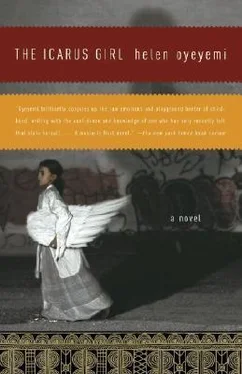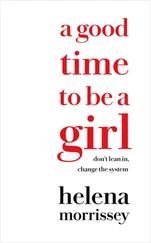Jess dropped to her knees and bowed her head, ignoring them. She didn’t mind them staring, she was used to it. When she had sufficiently quieted, she lifted her head.
“TillyTilly,” she called softly, then waited, listening, looking for TillyTilly to come skipping down the road, or running, maybe, or even to appear silently beside her.
Can’t you see I’m sorry—
No Tilly. Jess felt weak and dizzy, but she got home, and went into the kitchen and leaned against the table. She didn’t realise how odd she looked until her mother came to find her and gave a little shriek of surprised dismay. Jess heard it only dimly, as if the sound was being filtered through small holes in her hearing, the rest of which was filled with a low, resonant humming.
“Heh! You this girl! You were fine just thirty minutes ago!”
Jess turned her head and gazed at her mum, tottering a little with the effort to keep her neck straight. How could she have started feeling this ill so fast?
“It’s Tilly,” Jess tried to explain. “She’s gone away.” But it didn’t come out properly, because something was the matter with her tongue; it felt far too big for her mouth, and made flaccid, flapping movements against her bottom row of teeth and her lips. She realised that she was making her illness-singing sounds again.
“Jessy,” TillyTilly said quietly, insistently, from somewhere in the room. “Jessy, Jessy, Jessy.”
Jess, sprawled on the bed with the covers half falling off her achingly hot shoulders, came down from where she was floating in the darkness with the long-armed woman, and rolled over from her stomach onto her back.
“JESSY,” Tilly said again, her voice full of impatience.
Jess hesitated; the voice sounded different with her eyes closed; it sounded. . older, somehow.
“Did you think I would leave you? We’re twins!”
Jess heard Tilly’s words, but didn’t respond. She didn’t want to. She was glad that Tilly had come back, but. . the woman with the long arms was smiling and telling her a story about a boy and a magic bird that spread its wings over the land and made everything green and good. . The words were making her feel fresher, coating her in dew. TillyTilly was speaking insistently, and her words were layering over and under the storyteller’s.
“. . Jessy, you guessed without me explaining that I’m. . that I’m not really here. I mean, of course I’m really here, just not really really here, if you see what I mean. . Most of the time I’m somewhere else, but I can appear, and you haven’t imagined me! Remember Colleen’s house? And the amusement park? You know you couldn’t have imagined those!”
Jess did not move, but she listened to Tilly and to the soft, accented voice of the long-armed woman saying, “. . And then the bird brought rain clouds, and its wings were pouring with rain, and the drought was over. .” She felt TillyTilly’s bony hand brush her face and then withdraw, and this made her open her eyes. TillyTilly was nowhere to be seen.
Later, when Jess was caught up in a particularly bad bout of the fever and the room seemed to be throbbing , widening and contracting with shimmering heat, Tilly came back, and Jess was scared. Tilly was standing by her bedside, and she was smiling, but she was. . folding over and crackling and jumping to different parts of the room like a piece of paper blown by a volatile wind. Tilly was paper-thin and peeling around the edges, and just beyond her, a pair of long, dark brown arms was snaking in through the open door, and the hands on the ends of them were trying to hold the smiling, paper-doll Tilly in place. She knew, now, that TillyTilly and the long-armed woman were somehow the same person, like the two sides of a thin coin.
There was no wind.
Jess screamed, and Tilly flew away, and her mum came instead.
Sometime in the night, Jess fell out of bed and lay exhausted on the floor. She made a feeble attempt to grasp the bedcovers with her hands so that she could pull herself back up, but soon abandoned the idea. She lay still, licking her dried-out lips, and tried not to hum or sing; she didn’t want her parents to be worried. Her mum had sat with her for the rest of the afternoon after her latest scream, forehead wrinkled as she distractedly scribbled notes for her book on her notepad. Jess, tumbling in and out of sleep, couldn’t be sure, but thought that she heard a baby crying. It wasn’t like proper crying, the way she’d heard babies on the bus crying — it was a weak sort of snuffling sound, ehh-hhh-ehhhh , as if the baby had already cried a lot. She lay still, staring straight up, a frown etched on her face as she tried to discern where the sound was coming from. It sounded quite near. She felt as if, beneath her breastbone, her heart was twisting in time to the feeble cries.
The sound grew louder. Jess paused, and then ducked her head so that she could see beneath her bed. There was a moment of pointillism, her vision swimming out of clarity and into a group of coloured dots, then reforming again. She couldn’t. . There was a baby there: a tiny baby, a whole baby , naked aside from the dirty white shawl it was wrapped in. A baby. Left there underneath her bed, somehow, how? Jess stared through the gaps between her spread fingers as the baby kicked its legs and coughed out another gasping cry. Under her bed. She couldn’t touch the thing, it wouldn’t be real, it would get bigger and bigger and heavier and heavier, and kill her, like in the story her mother had told her about the wicked spirit that disguised itself. She couldn’t see its face; it was so helpless, it was tiny; the thing was crying, she couldn’t touch it, could she?
Almost without realising it, Jess had carefully placed her hands around the baby and brought it out, and settled it awkwardly on her lap so that she could put her finger into its feverishly hot little fist. The child was silent now, staring and solemn.
Oh my God, her skull—
Jess could see places where the top of the baby’s head looked scarily soft, and was seized with a fear that she would let the child drop and her head would smash open. Then she checked herself. Why had she supposed that the baby was a girl? There was no way you could tell from the pale, wrinkled-up little face with its luminous eyes filled with brown light. The hair was dark and tightly curled. It was tangled. She tried to draw the finger of her other hand through the baby’s hair, and then realised that she wouldn’t be able to keep the baby on her lap if she did so.
Whose are you?
Jess sat for a few minutes, her head pressed against the side of the bed to stop it from aching so, her finger caught in the baby’s hand, her eyes fixed on the girl — she knew it was a girl. The girl stared at her as well. She waited for the baby to get heavier.
Then there was a rush of air as TillyTilly leant over from Jess’s bed and deftly slipped the little girl from Jess’s lap. Jess jumped, then managed a small, sleepy noise of relief that someone was here to help her. She climbed onto the bed so that she could watch TillyTilly playing with the baby, bouncing her up and down on the covers, moving her arms and legs through walking motions. When she caught Tilly’s eyes, Tilly smiled, but said nothing and continued to dandle the little girl. Jess’s head felt worse and she could see spots of heat begin to float before her eyes.
She closed her eyes and when she opened them again she was lying flat, and the air was filled with the sound of the baby’s crying. TillyTilly was sitting at the end of the bed, and she spread her arms wide the better to show their emptiness. Jess fought to sit up, but she couldn’t; it was as if there were weights on her chest. She quickly became terrified. Why could she only hear the baby? She wanted to see her again, play with her.
Читать дальше












